How INFJs Process Emotions
“The best and most beautiful things in the world cannot be seen or even touched. They must be felt with the heart.” – Helen Keller
As an INFJ, you experience emotions in a complex and beautiful way. Today I want to explore your unique way of experiencing feelings, sorting them out, and understanding them. Diving deeper into how you do this can help you to give yourself more grace, understand yourself more fully, and also understand why the way you handle emotions is different from how others handle emotions.
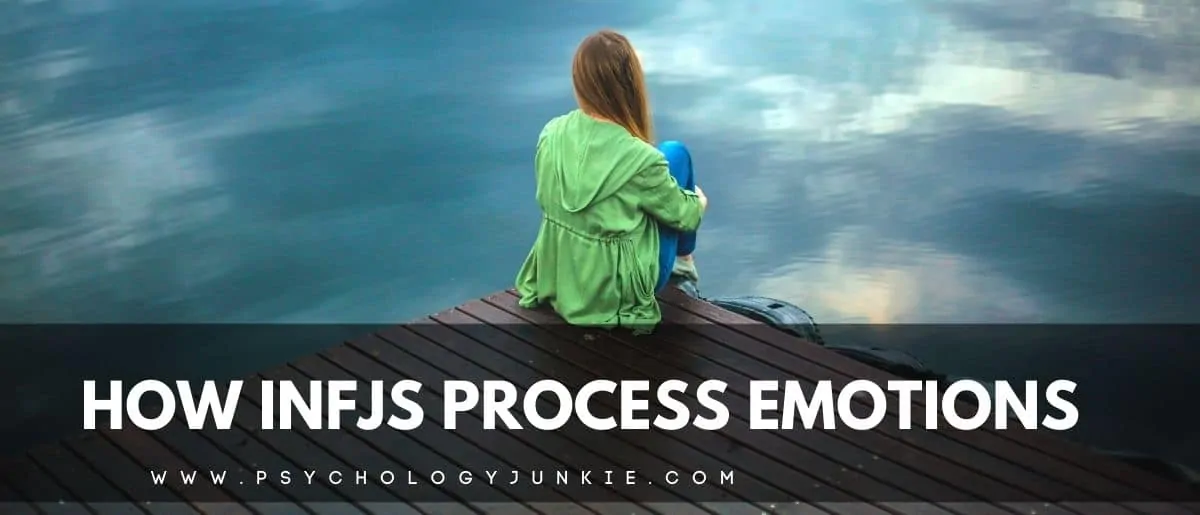
Table of contents
Estimated reading time: 9 minutes
INFJs and Emotions
Everyone experiences emotions. From ISTJs to ENFPs, emotions are a universal human experience. Nobody can help experiencing them, but what we do with them is very unique. Our upbringing colors our emotional experience – were you raised in a family that encouraged open emotional sharing? Or were you in a family that forced the suppression of emotions?
Personality also plays a part in how you process emotions. Some types process their feelings internally, while others need to process them externally.
How Do INFJs Process Feelings?
As an INFJ, you have a unique mental process called Extraverted Feeling. Everyone in the Myers-Briggs system has both introverted and extroverted qualities – this is what makes each type balanced and capable of introspection and interaction.
As an INFJ, you’re an introvert – your dominant mental process is Introverted Intuition (Ni). But you also have an extroverted side. That side is filled by the “Feeling” side of your personality. Your introverted side is filled by Intuition and Thinking, and your extroverted side is filled by Feeling and Sensation.
What Does This Mean For You?
Have you ever been called an “extroverted introvert”? Were your friends surprised when you told them you were an introvert?
There’s a reason for that!
Because you’re an INFJ, you show the world your feeling side. Your feeling side is focused on understanding people, creating harmony, and getting others’ needs met.
You are wired to notice the emotional atmosphere around you. Your extraverted feeling side (yes, it’s spelled with an “a” grammar police) is like a radar that detects the emotional wavelengths of the people around you. You notice shifts and patterns in people’s moods. When you’re with your friends you’re tuned into their feelings and experiences and needs. In fact, you may struggle with social silences because you sense that there’s an awkwardness in the atmosphere when that happens. Your extraverted feeling side tries to create a harmonious, comfortable mood for others (and, in turn, yourself).
You’re a People-Reader
Has anyone ever called you a human lie-detector? Do you get a sense of what people are like without having to be told? As an INFJ, your feeling side and your intuitive side work together to give you insights into the underlying emotions and motivations of other people.
Your intuitive side asks questions like:
“What else is going on here?”
“What’s the hidden meaning of this?”
“Is there a pattern here?”
“What does this mean for the future?”
“What are the long-term implications of this?”
Your feeling side asks questions like:
“How is this person feeling?”
“What emotional cues am I getting from this person?”
“What does this person need?”
“What are the words and physical signals of this person telling me?”
“What does this body language mean?”
“What are the social expectations here?”
“How might the social expectations in this room be impacting the message I’m getting from this person?”
Because your intuition and feeling work together in this way, you’re able to pick up on clues about people without having to try all that hard. You naturally sense what’s going on beneath the surface and this is what gives you those startling epiphanies and insights about people.
Because of your insightful nature, you are adept at understanding and identifying other people’s emotions. This is probably why INFJs are overrepresented in counseling fields (per the MBTI® Manual). This can also mean that you get overloaded by other people’s emotions or used as an emotional “dumping ground.”
Just like this meme talks about over here…
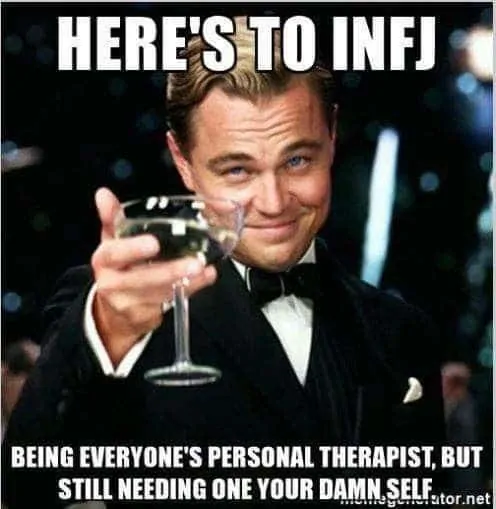
How Do INFJs Process Their Own Emotions?
This is where it gets a little more confusing. You’d think that since you’re so skilled at understanding other people’s feelings that you’d also be a wizard at understanding your own.
Unfortunately, this isn’t the case.
Because your feeling side is directed outward, you have a gift for understanding other people’s emotions and the vibes, values, and expectations of the external world. That’s a great thing! But it also means your inner feelings can be murky, confusing, and hard to decipher.
You may feel a flurry of intense emotions and feel like there’s no way for you to ascertain their meaning.
That’s because you process information internally through Introverted Intuition and Introverted Thinking. While these mental processes are incredible, they’re not great at sorting out emotions. Processing your own emotions through your thinking side is like trying to comb your hair with a spoon. It’s fairly difficult and it would take a ton of time and energy.
This means that as an INFJ if you don’t have the right coping mechanisms, you can feel tossed and turned by emotions that you can’t understand and you’re constantly trying to rationalize through your thinking side. You try to make logical sense of your emotions (hard to do), you try to guess at whether your emotions are “accurate” (also hard to objectively prove). You may even struggle to find words that fit your emotions properly.
How Can INFJs Process Their Emotions More Effectively?
First of all, stop beating yourself up about not being able to sort out your emotions with your thinking side. Stop trying to comb your hair with a spoon!
Secondly, realize that you need an external way to get your emotions out. Write them down in a journal, speak them out to a trusted friend, or say them out loud to yourself!
When you do this you enable yourself to process your own feelings through Extraverted Feeling. You need to HEAR your emotions to understand them. You need to read your emotions on a page to “get” them. Sure, you might be able to identify that you feel “sad” or “angry” or “happy” but you may not be able to pinpoint why, what to do about it, or what it means for you. You have to extravert those feelings (push them out into the world) in order to process them in an effective way.
This doesn’t mean you should just start yelling at people any time you feel angry (I doubt you wanted to do that anyway). But it does mean that you should realize that when you’re verbalizing your feelings they may be “half-baked.” You may change your mind about how you feel after you’re done verbalizing your feelings or writing them down.
Here’s a Visual Example:
Imagine that your feelings are a broken piano for a moment. When you express your feelings (extrovert them) you are laying out all the broken pieces and examining them. You aren’t going to close your eyes and visualize the broken piano pieces, you’re going to observe them in the external world. Then you’re going to re-arrange the pieces, get your tools, put them back together, and try to decipher why the piano (your feelings) broke and how to fix it (them).
If you, as an INFJ, don’t extravert your feelings you’re trying to fix a piano inside your mind. That doesn’t work! You’ve got to get all the pieces (all your feelings) out there. You need to hear them, visualize them, and analyze them in the external world. Then you can figure out what they mean, what you need, which feelings are true or false, and how to possibly repair them.
The Dangers of Internalizing Your Feelings
When you keep those feelings inside they can lead you into believing false things about yourself or others.
Unsorted feelings tend to be generalized and murky. You may think things like….
“My feelings are stupid”
“I’m dumb for feeling this way”
“That person hates me”
“I’m so angry and this is everyone’s fault”
or conversely, even positive feelings may be leading us down a dangerous path…
“I’m so happy, that means this is good” (in this case, this could mean staying in a bad relationship, doing a risky behavior, etc,.)
Our feelings can trick us because we can’t sort them out internally very precisely. We can only sense them in a general way. And then (usually) we just break them all apart with our thinking side until we’re putting them all in logical categories that don’t even fit.
So get those feelings out, INFJs! Write them down and read them back to yourself, talk to someone you trust, speak them into a voice recorder and listen to them. Let your extraverted feeling side do the job it was meant to do!
Don’t Relate?
If you’re reading all of this and struggling to relate, it could mean that you’re an ISFP or INFP personality type. INFPs and ISFPs use Introverted Feeling instead of Extraverted Feeling. Because of that, IFPs do best when they can internally process their feelings. They pinpoint them and understand them best in isolation and reflection. It’s still good for them to express their feelings, but they usually do that for validation and acceptance. They already know what their feelings are. INFJs, in contrast, often externalize their feelings to get advice, to sort them out, to understand them. Understanding and perspectives are what they are after more than validation (although, let’s be honest, I think everyone craves a certain amount of validation).
You can find out which personality type fits you best in our test: Are You an INFP, ISFP, INFJ, or ISFJ?
What Are Your Thoughts?
Did you enjoy this article? Do you have any insights or questions? Be sure to let us know in the comments!
Find out more about your personality type in our eBooks, Discovering You: Unlocking the Power of Personality Type, The INFJ – Understanding the Mystic, The INFP – Understanding the Dreamer, and The INTJ – Understanding the Strategist. You can also connect with me via Facebook, Instagram, or Twitter!
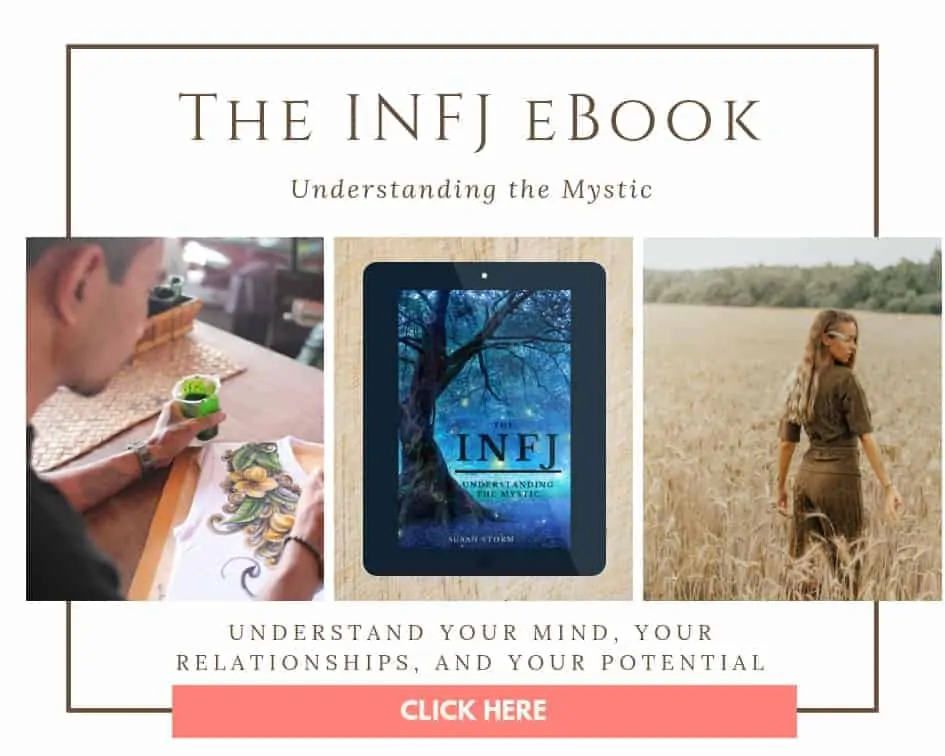

Subscribe to Our Newsletter

Want to discover more about personality type? Get the inside scoop with Susan Storm on all things typological, along with special subscriber freebies, and discounts on new eBooks and courses! Join our newsletter today!


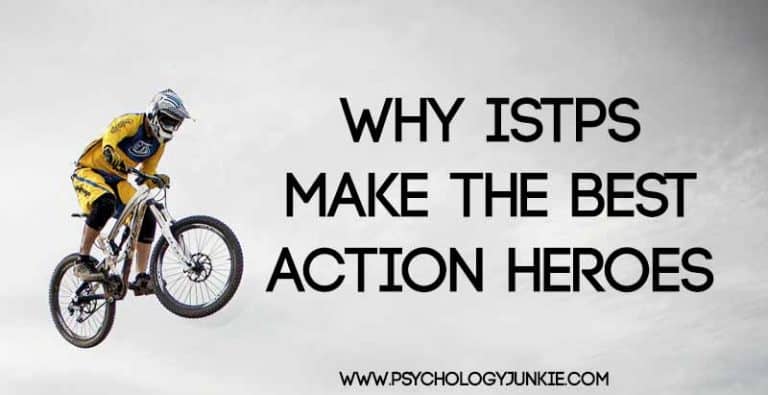
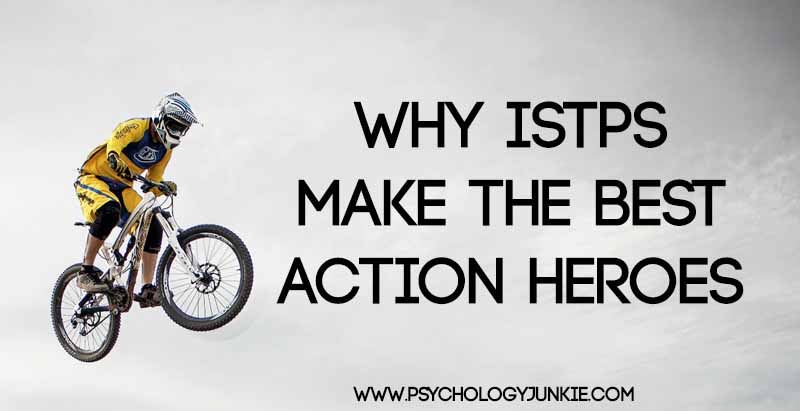
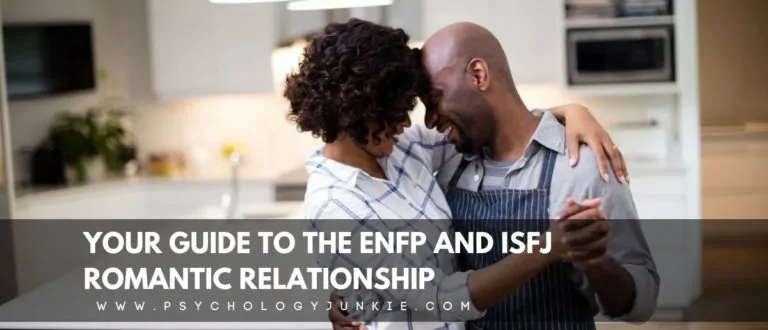
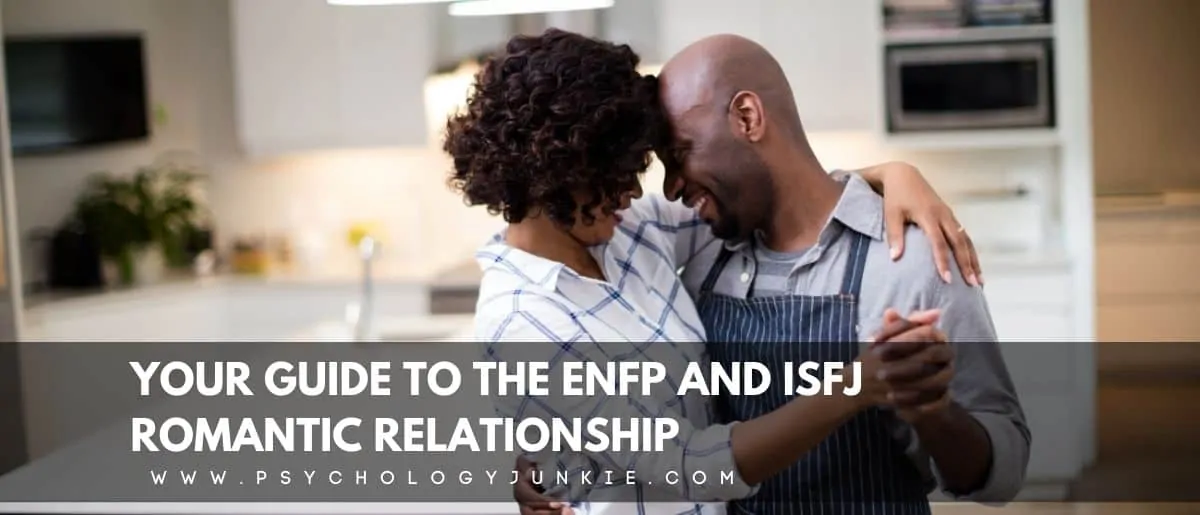
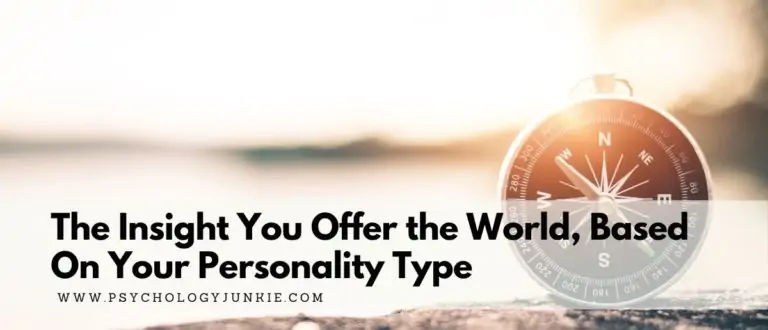
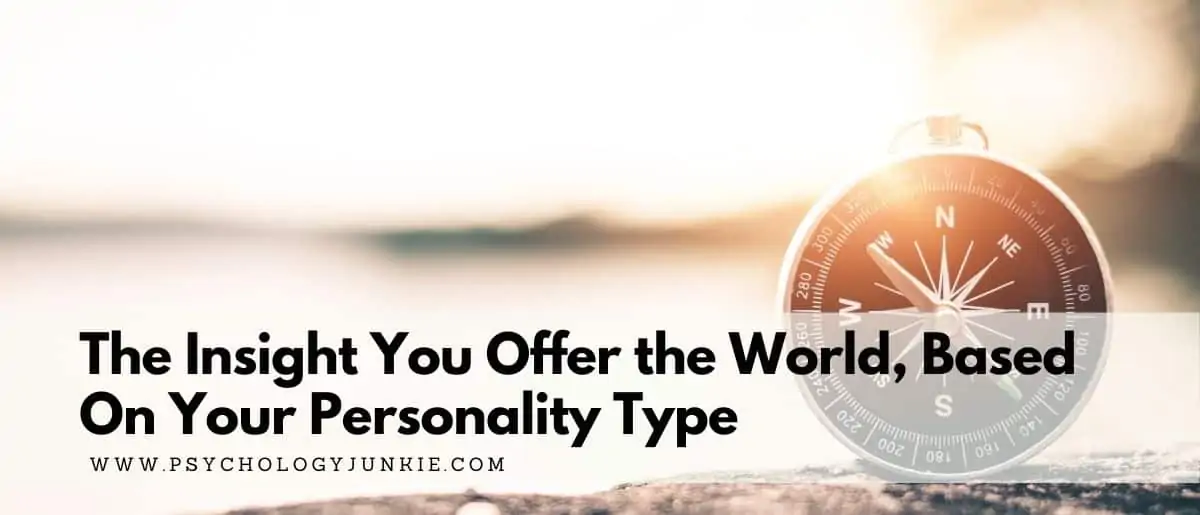
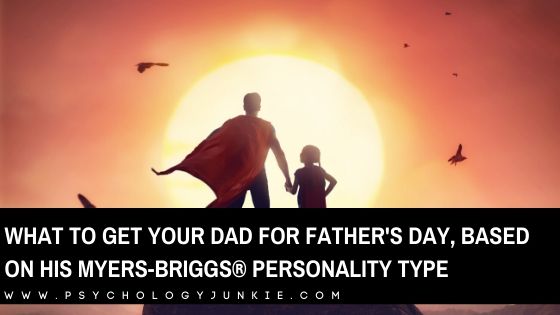
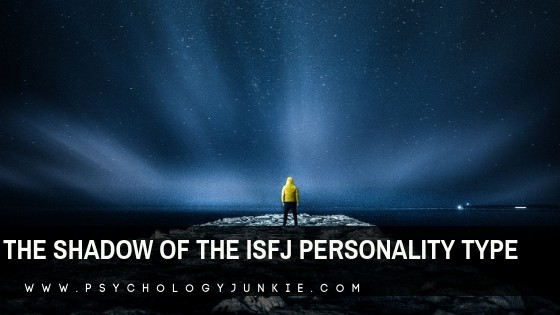


INFJ here and I relate 1000%! I usually need someone to talk to or do some journaling in order to find out what I’m feeling and why. I also tend to explain what’s going on inside of me using scientific terminology instead of just letting my emotions run free… Most people don’t get it (especially the INFPs I’ve encountered throughout my life) and tell me to just “let it flow”, which is very hard for me to do (I see some of my displays of emotions as a factor that may cause distress in others, so my Fe kicks in and stops me from losing it).
Thanks for the article, Susan!
I read this everyday, I find it very interesting. as with most people I’ve always felt different, that I didn’t fit in. and you may have answered this question in one of your articles, but as an INFJ myself, are we born this way, or do our experiences mold us, or a combo of both? thanks
As an INFJ this makes total sense to me. It blows my mind how easily I seem to understand others feelings and what a challenge it is for myself.
One of my favorite ways to get my feelings out is to express then through music. I find that I will choose a song or make up music that matches my emotions. Sometimes when I hear someone else singing, my extraverted feeling not only recognizes their emotions, but also realizes that I feel the same way myself.
Thank you so much! This was very useful. ✌❤
Thank you for this article! It’s super helpful for understanding my internal chaos.
Thanks for reading it Batya! It really means a lot 🙂
Thankyou, this post will change my life! I am an INFJ in my 60s, and have known I am an INFJ since my 30s. Despite knowing a fair bit about myself as an INFJ, and struggling with my emotions and trying to work out how to sort them out, I never grasped the importance of extraverting them per se. I knew talking them out helped but one can’t always find an appropriate confidante.. I can’t wait to practice this regularly: I think its going to have a huge impact.
I really hope it does Kristen!! I’m so glad you were helped by this 🙂
Great advice! My cat just passed away last week and at the same time, a new person just came into my life. Needless to say, I was overwhelmed. I’ve been constantly talking to my friends about my feelings for once, even though I feel like a burden to do so. But it’s helping me process my grief and confusion, and helping me find the way forward.
I think this is also why we INFJs back read over what we type, especially if it’s concerning our complex thoughts or emotions! This is a great tool for all of us to remember, as usually when I internalize, it just becomes depression and negative self talk, with no real answers.
Kudos from the Grammar Police!!!
Thanks,
Lol, thank you!!!
I think you are exactly right, but unfortunately as a teenager my hidden diaries were found by my mentally ill parent. What I had written in there, especially about my first sexual experiences, was used against me. I felt completely violated and never since have I been able to keep a diary or write down feelings without fear that somebody would see them. I have a lot of trauma around externalizing feelings. I do experience a lot of murkiness around who I am, what I want in life, even whether or not I like a particular person. I always thought it was because I can so easily shift perspective – see the other’s point of view more readily than I can see my own! Thanks for your blog. It’s very well done.
Hi Susan,
I’m so grateful that you write this article.
Recently I have been through a lot of emotional events, mostly about relationship with my “girl” friends. by the way I’m male, and also a Christian.
I used to be so confused about why ppl just don’t understand me, and feel lonely and sometimes sad about it. Even after I knew I’m INFJ, I still expect the miracle happen, but it just doesn’t.
But, after my friend in church gave me a “tool”, which is to write a letter to God, it was just refreshed. I would love to tell you more about this if you are interested.
But I guess all I wanna do is to share with you that I’m so relate to your articles, and thank you for doing this, being a part of my journey of becoming fullness, gradually.
Hi Norman!
I’m so glad that you were able to write that letter and that it helped you! I definitely think writing letters and journaling is so healthy for INFJs. I’m also really glad you can relate to the articles I’ve been writing! That’s a huge encouragement 🙂 Thank you!
Susan
Excellent article, Susan! I definitely relate and it so explains my relation to my emotions to me. When I am not able to speak to another person when I am upset, I definitely feel better speaking them out loud, especially when I’m in my car for some reason :).
Thanks for the insight and the recommendations!
Thank you Neena!! I’ve definitely spoken my feelings out loud while driving before!! 🙂
Hi Susan, like all the other INFJ’s who have commented, a big thank you from me. Over the years I’ve had some very insightful counselors who have reflected back to me what I’m feeling because I just can’t find the words. That’s how I’ve gradually built up an internal catalog of feeling states that I can refer to, so I can work out what I’m actually feeling. Also now I know from your article that’s a very introverted thinking thing to do! But it definitely helps. It is so weird understanding everyone else but not oneself. I used to think I was a sociopath or something, apparently not being able to feel. I very much appreciate your shedding light on this and reassuring me I’m not a bad person. And I talk to myself too, so now I know that’s actually therapeutic and not crazy.
Hi Susan thanks for writing this living in a place where people most of the times ask you supress your emotions and because of your emotions sometimes even consider you a pyscho and sometimes you evenl myself think that it might be a truth thanks alot for shedding light on this it helps alot now in understanding why l am this way😅🙂👍
What a great idea! This makes very good sense, especially for the labeling of happy equals good and unhappy equals bad. Journaling does help me figure my motives and longings out. Thanks
100%!!! I’ve never read anything that made more sense than this. This is me all the way. I’ve always felt there was something wrong with me, I wasn’t normal since I was a young child, and it’s only increased and proven true over the years. It’s a really dark place, and not being able to trust or open up to anyone has caused me to sink into despair. These articles make me feel that someone on earth possibly understands, so thank you. I’m really struggling so please pray for me.
This article has made the scale of never being able to decide, definitively, my personality type. The cherry on the cake, is your writing this from a “we” perspective and asking for a Settlers of Catan marathon. BOOM!!! Pastime of my heart, and a literal goal. TY.
This article brought me to tears. I struggle immensely trying to sort through these intense feelings I have. I pick up on the slightest patterns or behaviors of people and it drives me crazy. Like I don’t want to care and at the same time I care too much. What is the point of such intense feelings? I need to know. I have noticed when I write my feelings or even speak the aloud to the wall, I do feel somewhat better.
Before I came across this article, I was feeling the sadness without understanding or knowing why I am sad. And I thought to myself, I need some answers…and within a minute of scrolling i found this. Brought me to tears, I can relate so much to everything I’ve read, it makes a lot of sense now. Grateful is all I am that there’s people like you to help people like me get a better, clearer perception of ourselves, so we can become better versions of ourselves. So thank you so much really.
Firstly I would like to thank you for your hard work and inspiring results as I’m a male infj who has gone through many challenging times and couldn’t explain nor connect to what the psychology field or psychiatrists were telling me till I got stuck inwards in trying to sort out my feelings by thinking a way out or logically trying to solve the loop I got stuck in. I truly want you to give yourself a pat on your back for your magnificent discovery.
Well, thank you Susan. Omg, thank you a million times over. Your article just answered so many questions I didn’t even realize I had! I must have said “Yes! Thank you, of course!” out loud a half dozen times. I have been in a bit of a bog, but this has brought hope back onto my horizon. So grateful!